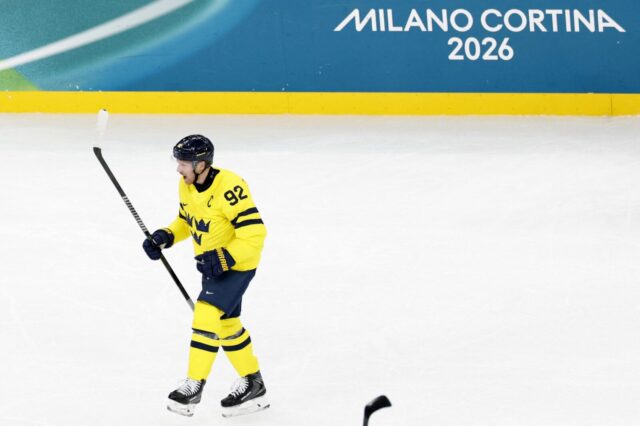Evan Rodrigues isn’t Nazem Kadri.
After claiming the third Stanley Cup in team history only a few days into the summer, the bills finally came due for the Colorado Avalanche. Such is life for almost every title team, as rivals and opponents across the league look to pry pieces and parts loose in an effort to improve their own chances to unseat the newly crowned champs.
Kadri’s departure was expected, as much as Avalanche fans dreaded it. The problem for Colorado was in replacing him; Kadri notched 87 points (28 G/59 A) last season and was a plus-13 in the regular season. He was even more spectacular in the postseason; scoring 15 points (7 G/8 A) in 16 games, while playing injured.
There was never a chance to replace that player. But in Kadri’s previous two seasons with the team combined, he had 30 regular-season goals and 38 assists, for a grand total of 68 points and an even plus-minus rating. While Kadri certainly earned his kudos for last season’s play, there also was no question that it was a notable, statistical outlier in his long career. As a second-line center last year — behind Nathan MacKinnon, Gabe Landeskog and Mikko Rantanen; renowned as the most explosive line in hockey, no less — and usually flanked by breakout winger Valeri Nichushkin (25 G/27 A) and reliable 20-goal scorer Andre Burakovsky (22 G/39A), Kadri was in a picture-perfect position to cash in on his contract season.
While the Avalanche were running roughshod through the league, Rodrigues and the Pittsburgh Penguins were scratching and clawing their way into the playoffs, where the 103-point team finished third in the Metropolitan Division, just barely avoiding a wild-card spot. Rodrigues, then 28 and in his third season with the Pens, played in all 82 games while setting new career highs in goals (19) and assists (24) while playing all over the team’s top three lines. Widely expected to net a mid-level, multi-year contract that would pay him upwards of $3 million per season, the versatile performer somehow slipped through free agency’s cracks.
Not so for Kadri, of course. Though he wasn’t signed early in free agency, the wait was definitely worth it as the rough-and-tumble, 13-year veteran earned what was likely his last big-money deal from the Calgary Flames, who signed him to a seven-year, $49 million contract, including an $11 million signing bonus. Calgary wrestled him from the Avalanche after Kadri had not only put together a career-best season by far, but had become something of a Bill Romanowski-esque, “glad he’s on our side” folk hero in the process.
Rodrigues signed with the Avalanche barely a week before training camp began, inking a team-friendly, one-year, $2 million deal to come to Colorado and play for the champs. “I was fortunate enough to have a good amount of offers this offseason in free agency, but the most important thing to me was joining a good team,” he told The Athletic in September. “It wasn’t easy waiting as long as I did, but my agent kept reassuring me, telling me to stay patient. I had full trust in him. I’m really happy the way it worked out — the fact that it’s a Cup-contending team; I’ve heard nothing but good things about the coach. It was one of those things where it seemed like a really good fit for me.”
Rodrigues’ ability to play at center, or at either wing position, gives coach Jared Bednar what he’s craved most in this wobbly 4-4-1 start to their title defense: Versatility. With what’s expected to be a lengthy absence for Landeskog, who didn’t have the luxury of time when he rushed back after knee surgery to play effectively during the Cup playoff run, and a nagging lower-body injury for Nichushkin, Rodrigues’ opportunistic goal-scoring touch has come in handy. Even though he doesn’t have an assist on the young season yet, his four goals tie him with Rantanen for second place on the team behind Nichushkin’s seven in seven games. No player on the Avalanche with multiple goals has averaged fewer than 20 minutes of ice time…save Rodrigues, who’s isn’t even averaging 18 while bouncing between Bednar’s top two lines.
Colorado’s nightmarish, early-season schedule has something to do with the team’s slow start — the Avs have already played three of their nine games on back-to-back nights, and will do so again in Tempere, Finland, where they’ll take on the Columbus Blue Jackets Friday and Saturday — and no team in the league has had a more taxing travel schedule.
“Obviously, we don’t get to pick the schedule,” defenseman Cale Makar said last week. “But yeah, it’s been crazy. We’ve had [multiple] back-to-backs already, where we’re getting in late and playing with a rested team the next day, so it is what it is. For us, it’s a good challenge, and that’s kind of the way that we look at it.”
Rodrigues has been as up for that challenge more than anyone on the Avs. In the three games this season in which Colorado has played on the second night of a back-to-back, he’s netted three goals on only six shots. He’s also clearly settling in with his new team, even if he doesn’t necessarily know where he’s playing on any given night, having scored all four of his goals this season in the Avalanche’s last five games. “Whatever I’m needed for, I relish the opportunity and try to take advantage of it,” Rodrigues said as camp began, and so far, so good.
Rodrigues won’t put up 87 points this season, but it wouldn’t be a shock, given his improving play and the talent of his new linemates — on either one of them — if he, like Kadri, had a career season in a contract year, as well. Rodrigues probably won’t get a new, $9 million contract, either, but in Colorado, he stands a very real chance of getting the most important thing to any NHL player: His name engraved in tiny letters on the greatest trophy in sport.
So, like a utility player in baseball, Evan Rodrigues brings his gear to the rink, looks at the lineup card, plays where he’s told, and takes it one day a time.
The rest will take care of itself.



